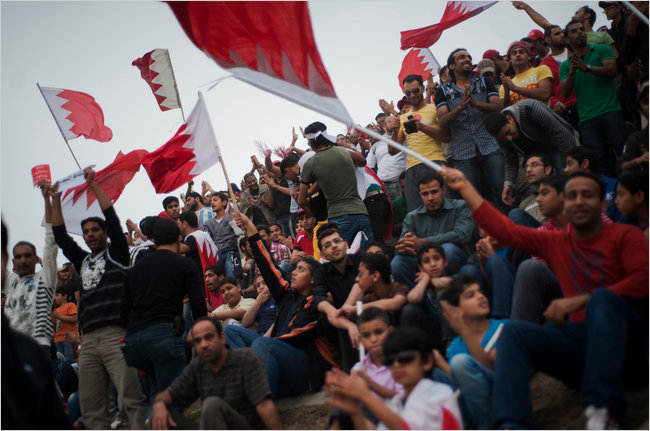

A call for political change in the Middle East is a deafening one in 2011. There was Tunisia and the ousting of President Ben Ali’s government, a repressive rule that lasted 29 years. Then protests started in Egypt, its neighbor, with the expulsion of the Mubarak regime. As Tahrir Square was flooded with the Egyptian masses, the president lasted 18 days. Now a small nation consisting of 33 islands, Bahrain, is next on the list; however, the nation has a different set of demands.
Unlike Egypt, the general population of Bahrain wants to transform their government and not completely abolish it. According to a CNN.com article, only three hard-line groups, Haq, Wafa and the Bahrain Freedom Movement, wish to see the monarch go and for Bahrain to be transformed into a republic.
“The issues in Bahrain have to do with the demands of the population for representation in their government,” said political science Professor Lewis Brownstein. “Demanding not that the monarchy go away, but that it be turned into a constitutional monarchy.”
The citizens of Bahrain want their voices to be heard. Those that rule Bahrain, the Al Khalifa family, are Sunni and have been in power almost 240 years. The current Emir and King of Bahrain is Hamid Ibn Isa Al Khalifa who has packed his cabinet of ministers with royal family members. The majority of the population is Shia.
“What they want is a figure-head king, and the governmental system to be a democratic system,” said Brownstein.
According to The Human Development Index (HDI), a composite of life expectancy, educational attainment and income, Bahrain rates high in terms of money and a “reasonably well-educated population.” Aversely, Egypt rates low for literacy levels, health conditions and housing.
Bahrain also has a population of young men who go to school and graduate, but are in a country that has a limited amount of employment opportunities.
According to S. Ilgu Ozler, assistant political science professor, 37 percent of the population is made of foreign nationals who came there to work as it is a rich-oil kingdom. This means that many of the local youth are left out of the best jobs, and that’s why there is a 15 percent unemployment in a country so rich with oil resources.
“[There’s] a great deal of dissatisfaction, particularly between young men,” said Brownstein. “If you want a revolution, there’s a surefire recipe for one: You educate young men, graduate them from their schools and then send them out into a society that has no employment for them, and you’ll get upheaval at some point.”
Some SUNY New Paltz students said they were concerned that there often is no plan post-revolution.
Marian Buzon, third-year geology major, said she understands the goals of protesters to gain independence from suppressive governments.
“[I’m] concerned with what they are going to do once they can accomplish it,” she said.
Meanwhile, in Libya the United States is considering having a no-fly zone through the United Nations. This has caused some to question how involved the United States should be in this social unrest across the Middle East.
Brownstein said in reference to Bahrain that “beyond encouraging democratic forces” we should not get directly involved.
“We have an important military base in Bahrain. It is very much in our interest to maintain our presence there,” he said. “Our fifth fleet is based there; we are engaged in an emerging confrontation with Iran. It would be most unfortunate to be expelled from the region.”
Andrew Sokolof, third-year political science major, agreed with non-U.S. involvement there. He said that the United States caused this “in a way with geo-political interests.”
The Bahrain protests follow a controversial election in 2010. They started on Feb. 4 when several hundred Bahrainis gathered in front of the Egyptian embassy in the capital of Manama. According to The Wall Street Journal, this was “one of the first such gatherings to be held in the oil-rich Persian Gulf states.”
Protests in the country continue.
“What is spreading around in the region is that a recognition that people can be involved in their political system, and that increasingly there seems to be a view that they have every right to be,” said Brownstein.
